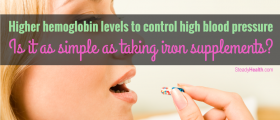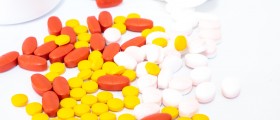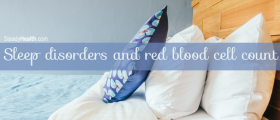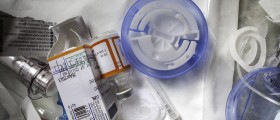
Hemoglobin is a metalloprotein found in erythrocytes. It contains iron and is engaged in process of binding and transport of oxygen. It is essential for all the cells in the body since it supplies them with a precious substance - oxygen. Once the oxygen is released and taken over by the cells, hemoglobin collects the carbon dioxide and transfers it to the lungs. In the lungs, after carbon oxide has been eliminated a new amount of oxygen is absorbed, the cycle repeats.
Under normal circumstance the level of hemoglobin ranges between 12 and 16 gm/dL in women, and between 14 and 18 gm/dL in men. In children the optimal level of hemoglobin is between 11 and 13 gm/dL. Newborns have slightly elevated level of hemoglobin (17-22 gm/dL). Everything below the determined levels is considered low hemoglobin level. The changes in hemoglobin level can be confirmed by a simple blood test. Even though a low hemoglobin level may affect people of all ages it commonly occurs among infants, children, pregnant women and athletes.
Symptoms and Signs of Low Hemoglobin
Low hemoglobin results in anemia. In case of slight decrease in hemoglobin the person may not complain about any symptom at all. Only if the level of hemoglobin drops significantly a person develops symptoms and sings such as feeling of tiredness, headache, dizziness and lack of concentration. These symptoms are not characteristic only for low level of hemoglobin.
Since insufficient amount of hemoglobin simply cannot transfer desirable amount of oxygen one may experience shortness of breath and can get tired easily. The body tries to compensate the lack of oxygen and forces the heart to pump blood rapidly which eventually leads to increased output of the heart and palpitations, chest pain and in people who are already suffering from certain heart conditions aggravation of the primary condition. A person suffering from low level of hemoglobin has pale skin and visible mucous membranes.
What are Causes of Low Hemoglobin?
The leading cause of low hemoglobin levels is deficiency of iron in the body. Iron is essential for production of hemoglobin and if not taken on a daily bases in sufficient amounts, an adequate amount of hemoglobin will not be produced. Furthermore, the condition can be associated with insufficient absorption o certain vitamins from the gastrointestinal tract. Some people are suffering from genetic abnormalities which lead to low hemoglobin. And finally, one more cause of low hemoglobin levels is bleeding. Loss of small amounts of blood (particularly if it lasts long enough) eventually leads to low level of hemoglobin.

















Your thoughts on this
Loading...